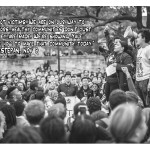By Claire Sheen
“I want everyone to close their eyes. Imagine you only have one minute left to live. Who is beside you?”
“I’ve only done this once before,” was Emi Mahmoud’s simple preface to this request.
Thoughts and faces of loved ones flickered through the minds of the crowd surrounding the Women’s Table on Cross Campus. We had come together to honor the lives of three young Black Sudanese-American men—two of them Muslim—shot and killed in Fort Wayne, Indiana the week before. We call them Our Three Brothers, but their names were Mohamed Taha Omar, Adam Mekki, and Muhannad Tairab. Two were cousins of our classmate Emi Mahmoud, ’16. The youngest—Muhannad Tairab—was only seventeen years old.
The killings were greeted largely with silence from mainstream media and government officials. What little information did emerge was filtered through ominous stereotypes. One of the vigil’s organizers, Daad Sharfi ’17, remembers reading articles for days only to realize that they were all “basically hinting at gang violence, hinting at a drug-related incident, hinting at things that would stereotypically be associated with Black bodies and to Black people. But without any kind of evidence.” Against this hostile backdrop, the Cross Campus vigil was its own statement. Ishrat Manaan ’17, another organizer, said, “We’re choosing to not let this be a meaningless blip in current events.”
Our Three Brothers were killed in a national climate where Islamophobia and anti-Blackness are rampant, even deadly. Just an hour before being interviewed, Sharfi—a junior in Ezra Stiles College—was asked twice whether she was a terrorist by a stranger at Blue State Coffee on York Street. “I just wanted to get out of there,” she recalls. And yet—“My immediate thought was, ‘Wow, that’s really sad to me, that that question being posed to me does not surprise me.’ ”
At the vigil, Mahmoud asked her audience to think of whom we’d want with us in our last thirty seconds of life, and implored us to contact them immediately after the ceremony. To Mannan, these words demonstrated that the fight against injustice “can be a personal and emotional one.” She continued: “It’s when you show [those affected] that they’re loved, and show them that they’re appreciated, and cherish them. Those are acts of resistance and remembrance.”
DOWN Magazine remembers and cherishes those affected by Islamophobia, racism, and police brutality as a whole. We honor and extend Emi Mahmoud’s poignant invitation to love, heal, and hope.



